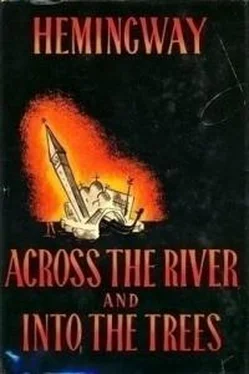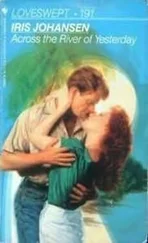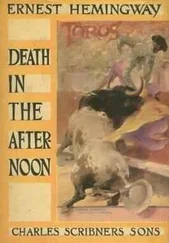'Should we go?'
'I thought you had made up your mind.'
'I had. But when you said it about unpopular guest it was unmade.'
'Keep it made up.'
'I can hold a decision.'
'I know. You can hold any damn thing. But, Daughter, sometimes you don't just hold. That is for stupids. Sometimes you have to switch fast.'
'I'll switch if you like.'
'No. I think the decision was sound.'
'But won't it be an awfully long time until morning?'
'That all depends on whether one has luck or not.'
'I should sleep well.'
'Yes,' the Colonel said. 'At your age if you can't sleep they ought to take you out and hang you.'
'Oh please.'
'Sorry,' he said. 'I meant shoot you.'
'We are nearly home and you could be kind now if you wanted.'
'I'm so kind I stink. Let somebody else be kind.'
They were in front of the palace now and there it was; the palace. There was nothing to do now but pull the bell cord, or enter with the key. I've been lost in this place, the Colonel thought, and I was never lost in my life.
'Please kiss me good night, kindly.'
The Colonel did and loved her so he could not bear it.
She opened the door with the key, which was in her bag. Then she was gone and the Colonel was alone, with the worn pavement, the wind, which still held in the north and the shadows from where a light went on. He walked home.
Only tourists and lovers take gondolas, he thought. Except to cross the canal in the places where there are no bridges. I ought to go to Harry's, probably, or some damn place. But I think I'll go home.
It was really home, if a hotel room can be so described. His pyjamas were laid on the bed. There was a bottle of Valpolicella by the reading light and by the bed a bottle of mineral water, in an ice bucket with a glass beside it on the silver tray. The portrait had been deframed and was placed on two chairs where he could see it from the bed.
The Paris edition of the New York Herald Tribune lay on the bed beside his three pillows. He used three pillows, as Amaldo knew, and his extra bottle of medicine, not the one that he carried in his pocket, was beside the reading light. The inner doors of the armoire, the mirrored ones, were opened in such a way that he could see the portrait from the side. His scuffed slippers were by the bed.
I'll buy it, the Colonel said, to himself, since there was no one else there except the portrait.
He opened the Valpolicella which had been uncorked, and then re–corked, carefully, precisely and lovingly and poured himself a glass into the glass which was much better than any hotel should use which was faced with breakage.
'Here's to you, Daughter,' he said. 'You beauty and lovely. Do you know, that, among other things, you smell good always? You smell wonderfully even in a high wind or under a blanket or kissing good night. You know almost no one does and you don't use scent.'
She looked at him from the portrait and said nothing.
'The hell with it,' he said. 'I'm not going to talk to a picture.'
What do you think went wrong to–night? he thought.
Me, I guess. Well I will try to be a good boy to–morrow all day; starting at first light.
'Daughter,' he said, and he was talking to her and not to a picture now. 'Please know I love you and that I wish to be delicate and good. And please stay with me always now.'
The picture was the same.
The Colonel took out the emeralds from his pocket and looked at them, feeling them slide, cold and yet warm, as they take warmth and as all good stones have warmth, from his bad hand into his good hand.
I should have put these in an envelope and locked them up, he thought. But what the ― security is there better than I can give them? I have to get these back to you fast, Daughter.
It was fun, though. And they're not worth more than a quarter of a million. What I would make in four hundred years. Have to check that figure.
He put the stones in the pocket of his pyjamas and put a handkerchief over them. Then he buttoned the pocket. The first sound thing you learn, he thought, is to have flaps and buttons on all your pockets. I imagine that I learned it too early.
The stones felt good. They were hard and warm against his flat, hard, old and warm chest, and he noted how the wind was blowing, looked at the portrait, poured another glass of Valpolicella and then started to read the Paris edition of the New York Herald Tribune .
I ought to take the pills, he thought. But the hell with the pills.
Then he took them just the same and went on reading the New York Herald . He was reading Red Smith and he liked him very much.
The colonel woke before daylight and checked that there was no one sleeping with him.
The wind was still blowing hard and he went to the open windows to check the weather. There was no light as yet in the east across the Grand Canal, but his eyes could see how rough the water was. Be a hell of a tide to–day, he thought. Probably flood the square. That's always fun. Except for the pigeons.
He went to the bathroom, taking the Herald Tribune and Red Smith with him, as well as a glass of Valpolicella. Damn I'll be glad when the Gran Maestro gets those big fiascos, he thought. This wine gets awfully dreggy at the end.
He sat there, with his newspaper, thinking of the things of that day.
There would be the telephone call. But it might be very late because she would be sleeping late. The young sleep late, he thought, and the beautiful sleep half again as late. She certainly would not call early and the shops did not open until nine or a little later.
Hell, he thought, I have these damned stones. How could anyone do a thing like that?
You know how, he said to himself, reading the ads. in the back of the paper. You've put it on the line enough times. It isn't crazy or morbid. She just wanted to put it on the line. It was a good thing it was me, he thought.
That is the only good thing about being me, he considered. Well I'm me, God–damn it. For better or for much worse. How would you like to sit on the can as you have sat almost every morning of your damned life with this in your pocket?
He was addressing no one, except, perhaps, posterity.
How many mornings have you sat in the row with all the others? That's the worst of it. That and shaving. Or you go off to be alone and think or not think and pick a good piece of cover and there are two riflemen there already, or some boy asleep.
There's no more privacy in the army than in a professional ―. I've never been in a professional ― but I imagine they run it much the same. I could learn to run one, he thought.
Then I'd make all my leading ― characters Ambassadors and the unsuccessful ones could be Corps commanders or command military districts in peace time. Don't be bitter, boy, he said to himself. It's too early in the morning and your duty's not completed yet.
What would you do with their wives, he asked himself? Buy them new hats or shoot them, he said. It's all part of the same process.
He looked at himself in the mirror, set in the half–closed door. It showed him at a slight angle. It's a deflexion shot, he said to himself and they didn't lead me enough. Boy, he said, you certainly are a beat–up, old looking bastard.
Now you have to shave and look at that face while you do it. Then you must get a hair–cut. That's easy in this town. You're a Colonel of Infantry, boy. You can't go around looking like Joan of Arc or General (Breveted) George Armstrong Custer. That beautiful horse–cavalryman. I guess it is fun to be that way and have a loving wife and use sawdust for brains. But it must have seemed like the wrong career to him when they finished up on that hill above the Little Big Horn, with the ponies making the circle around them in all the dust and the sage brush crushed by the hooves of the horses of the other people and nothing left to him for the rest of his life but that old lovely black powder smell and his own people shooting each other and themselves, because they were afraid of what the squaws would do to them.
Читать дальше
Конец ознакомительного отрывка
Купить книгу












